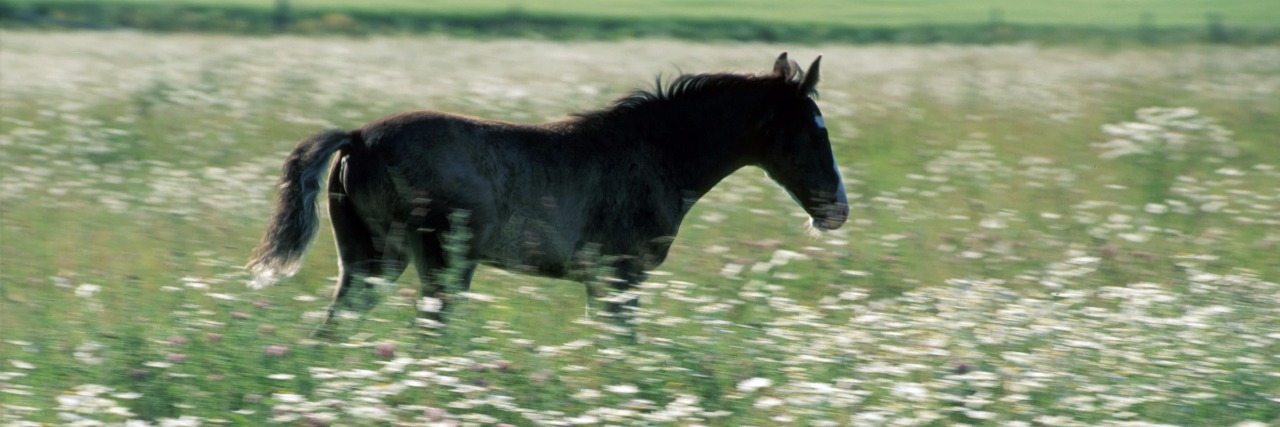Having been a horse enthusiast since I was 8 years old, working in the industry and owning my own horses, they have always been my go-to for comfort and help me have some peace from the things my depression tells me — the things I don’t always remember to be untrue: the feelings of worthlessness and burden. My horses have always been able to calm my mind and let me have time to just be. They see the truth in my soul and show it to me. They are perfect emotional reflections, so while I might not be able to see things when reflecting on myself, I see it when they present it to me and am able to help them through whatever they are experiencing, which in turn helps me too.
During my most recent bout of depression I decided to take on a new horse. She was a skinny, unhandled, never-been-touched 2-year-old black mare.
It’s amazing to me, working with this mare, how sensitive and intuitive she really is. She is progressing well in her handling and is putting on weight like no tomorrow.
The one thing I’m most grateful for is her ability to teach me about myself. The similarities between us are uncanny. I started going to therapy a few months ago, and I really struggled initially opening up to a complete stranger. I struggle answering direct questions and lose my ability to express myself fully.
Below are some of the observations I’ve made working with my little mare.
- When she arrived you couldn’t approach her. Period. She shut down and went into flight mode
- I was very much shut down.
- You could not approach her directly or she panicked. She had to get used to your presence.
- I clamp down if directly approached regarding anything that makes me unsure or conflicted until I relax around you.
- Instead of forcing the direct contact, I ask her to move her feet, ask her smaller questions — can she change direction, can she stop? She doesn’t want to run so we need to make “stop” relaxing, a good place to be.
- I severely dislike not being able to express myself. If I can’t talk, I write, I move my mental “feet” — can I find a safe space to “relax and stop?”
- Once she understands that stopping is a safe place, we can work on boundaries. How far can we go while keeping that space safe? Lots of approach/retreat is involved.
- I’ll drop my guard a little. The truth comes out in riddles that are safe enough to share, giving pieces of myself but not enough to cause harm.
- She is still unsure about direct approach. She’s less suspicious but won’t broach the last meter to contact. I can move her feet easily and guide her into different positions/locations and offer her a safe place in each of them, building her confidence.
- I am more open to some direct questioning and am more willing to actually try to engage in difficult conversations if I have a safe place to return to if I find I’m out of my depth.
- She is willing to offer more but second guesses herself and her choices. She will offer a few steps toward me, then realizes what she’s done and panics thinking she’s put herself in danger. There is a release of pressure if she approaches.
- The amount of times I second guess myself is ridiculous — so many lost opportunities to say what I want or how I feel simply because I second guess everything and assume the world is going to fall down if I say/do the wrong thing.
- She needs me to move slowly and clearly. She doesn’t understand fast, jerky, inconsistent movements (physical or mental). You cannot go in with the intent to get near her. It changes your body language and makes you too “loud.” And she questions everything as though it’s a threat.
I go to a therapist every other week, but I get therapy every day I’m with her.
We want to hear your story. Become a Mighty contributor here.
Thinkstock photo by Ingram Publishing

